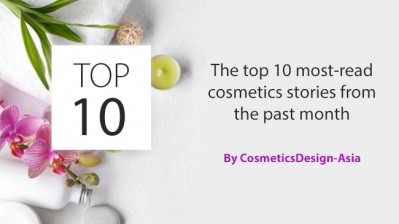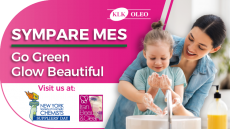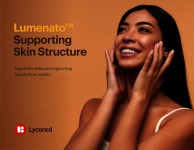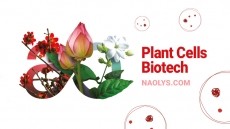Top of the chain: Top 10 most-read stories on beauty and personal care suppliers of 2021
![The biggest stories of the year featuring cosmetics suppliers. [Getty Images]](/var/wrbm_gb_food_pharma/storage/images/_aliases/wrbm_large/publications/cosmetics/cosmeticsdesign-asia.com/headlines/market-trends/top-of-the-chain-top-10-most-read-stories-on-beauty-and-personal-care-suppliers-of-2021/13086424-1-eng-GB/Top-of-the-chain-Top-10-most-read-stories-on-beauty-and-personal-care-suppliers-of-2021.jpg)
1 – From Asia to the world: Why the next wave of niche fine fragrance brands will come from Asia
The unwavering appetite for niche perfumes and brand mastery of digital communication are some of the reasons why we can expect more niche fine fragrance brands from Asia vying for the international spotlight.
In the last decade, the fragrance market has been disrupted by the arrival of niched fragrance brands such as Byredo, Le Labo, Diptyque, and Jo Malone.
While the big brands may still dominate, they are facing stiff competition from these so-called cult brands as consumers lean towards a more personalised and intimate fragrance experience.
In 2019, Estée Lauder Companies reported that its fragrance category benefited greatly from the growth of Jo Malone, Le Labo and Tom Ford, which pulled in net sales of approximately $81m.
2 – Strategic markets: Masstige skin care and sustainable beauty identified as huge opportunities for growth in China – Quadpack
Masstige skin care and sustainable beauty are two of the biggest opportunities for China growth, according to cosmetics packaging firm Quadpack.
As part of its 2020-2025 strategy, the Barcelona-based company is strengthening its presence in its key territories including Asia Pacific, which is important for the firm’s future growth.
“Asia Pacific is an important priority for the group in terms of future growth potential. We’ve already penetrated Korea and opened an office in Japan last June, and we have a long presence and support in Australia and New Zealand,” said Raj Savji, APAC managing director, Quadpack.
He added: “In terms of APAC, China is a really important market for us. We do see China as a strategic market. China represents 32% of beauty consumption in Asia and 11% worldwide. The market size of €52.5bn is estimated to grow to €80bn.”
3 – Relief for the senses: Wellness-driven consumers seeking comfort in sensory beauty products - Dow
The surge in self-care habits during the pandemic is driving consumers to embrace sensory beauty products that offer mental and emotional comfort.
As beauty consumers become more discerning, the multisensorial aspects of a cosmetic product have become equally important as their performance.
Texture, for instance, is one of the key sensorial elements of a cosmetic formulation and can subconsciously play a significant role in the perception of quality and efficacy.
Since the early days of the COVID-19 pandemic, the sensorial aspect of a product has become even more crucial as people turned to their personal care routines to find solace as well as replace the loss of human contact and tactility.
4 – ‘A new philosophy’: Microbiome-friendly solutions key to filling gaps in Asia’s adult acne care market
Microbiome-friendly skin care may be what’s missing from Asia’s adult acne care market where gentle solutions for acne-prone sensitive skin is lacking.
Acne typically occurs among teenagers during puberty, but it can also occur in adulthood.
“When it comes to acne, it’s important to note that it does not just affect the younger generation, the teenager, but it also affects adults in their 20s or 30s. For them, acne can be different from teen. It can be in the form of non-inflammatory lesions, such as blackheads and whiteheads,” said Federica Lam, regional marketing manager of Lucas Meyers Cosmetics.
Despite the growing number of adult acne cases, which are driven by lifestyle and environmental changes, there appears to be a lack of solutions to deal with this persistent problem.
5 – Shroom protection: Mushroom Material targets cosmetics sector with sustainable alternative to styrofoam and cardboard packaging
New Zealand start-up Mushroom Material has developed a sustainable mushroom-based material as an alternative to polystyrene styrofoam and cardboard packaging and is targeting the cosmetics sector for its first products.
Made from the vegetative part of mushrooms called mycelium and fibrous agricultural waste, the material is robust to withstand impacts, yet is biodegradable within six weeks.
Suitable for products from cosmetics to cutlery, the packaging is customisable to any shape, size and surface finish. It is, pound for pound, strong than concrete and has a better thermal insulator than fibreglass. Furthermore, it is odourless, mould resistant and non-toxic.
The company was founded by Shaun Seaman in 2020 after observing the huge amounts of waste material produced globally.
6 – Hijabi hair care: Unmet needs creating massive opportunities for industry players - Dow
The unmet hair care needs of hijab-wearing Muslim women are creating huge opportunities for players to develop products that specifically target covered hair.
A hijab is a headscarf worn in public by some Muslim women. Despite not being on display most of the day, the hair beneath the scarf has unique needs.
“One of the main concerns for women who wear hijabs is keeping their hair feeling fresh. Since they may wear a hijab for many hours at a time, they can experience oily hair and scalp as well as dandruff because of the excessive sebum produced,” said Cedric Toh, regional marketing manager (Southeast Asia, Australia & New Zealand) Dow Personal Care.
“This is a major concern in places with high humidity, like Indonesia… Often women will cut their hair very short just to feel more comfortable and avoid these issues.”
7 – Skin shield: Multifunctional and natural claims key for protective beauty following COVID-19
The COVID-19 pandemic will heighten demand for skin products that protect ‘against a host of aggressors’ beyond pollution, claims the founder of a New Zealand natural ingredient firm.
With more consumers expressing concern over the impact of pollution, beauty products that claim to protect against industrial pollution have become more common in the past few years.
“We noticed this trend starting years ago along with the issue of pollution. Asian consumers especially became more aware of the harsh pollution in places like China,” said Andrea Taimana, founder and CSO of Organic Bioactives, a New Zealand-based cosmetics ingredient firm.
“At the same time, there was a lot of research done about how free radicals from environmental pollution and sun damage combined are really harmful to the skin.”
8 – Masking impact: Is the sustainable beauty movement threatening Asia’s sheet mask fixation?
Facial sheet masks are an Asian beauty staple, but consumers are wising up to the waste these single-use products can generate and driving the need for more sustainable solutions to keep the category thriving.
Speaking to CosmeticsDesign-Asia at the height of the pandemic last year, specialty fibres company Lenzing expected the market size of facial sheet masks in Asia to grow as consumers began to place self-care and wellness as a top priority.
This was reflected in the growth of Lenzing’s Veocel brand which recorded double-digit growth in Asia last year. Veocel branded lyocell fibres are used as a facial sheet mask material for Asian brands including Watsons, Sensatia Botanicals and Annie’s Way.
While facial sheet masks have been considered ubiquitous in Asia for years now, awareness of environmental damage caused by single-use products – like facial sheet masks – are threatening their place in the Asian beauty routine.
9 – Power of sandalwood: Quintis to double down on cosmetics market on the back of antioxidant effectiveness
Australian sandalwood supplier Quintis is eyeing new opportunities in the cosmetic space after a peer-reviewed study showed that it is a more potent antioxidant than vitamin E.
Quintis Sandalwood is a supplier of Indian and Australian sandalwood raw materials, including oil, powder, logs and chips. It supplies sandalwood materials to multiple industries for use in fragrance, cosmetics, as well as incense and religious carvings.
The firm owns and manages an Indian sandalwood plantation that spans over 12,000 hectares across northern Australia and is home to more than 5.5 million trees.
Recently, the company has been placing more emphasis on the cosmetics side of the business, believing it could tap into the demand for natural products in the market.
10 – ‘Acceptance and celebration’: Changing attitudes towards ageing creating opportunities in perimenopausal hair care
The shifting attitudes towards ageing is creating a huge opportunity for cosmetics companies to create solutions for the perimenopausal demographic, especially in the hair care sector, says one ingredient expert.
“The conversation is moving towards acceptance and celebration and as an industry we are moving away from anti-ageing,” said Lisa Carroll, director of Australian ingredient manufacture, Native Extracts.
“Our products, be it topical or ingestible will no longer focus on lifespan. We have already achieved that. Now we will focus on healthspan. We are all going to live longer, so everything we do will come down to feeling and looking the best we can for as long as we can.”
Considering this shift, the company believes there are opportunities within the perimenopausal demographic, which remains largely untapped by the cosmetics industry.
![A new series of skin care products claims to mimic the effect of meditation on the skin. [Phytoflow]](/var/wrbm_gb_food_pharma/storage/images/_aliases/wrbm_medium/publications/cosmetics/cosmeticsdesign-asia.com/headlines/formulation-science/skin-meditation-phytoflow-claims-to-unlock-benefits-of-meditation-with-natural-extracts/13003944-2-eng-GB/Skin-meditation-Phytoflow-claims-to-unlock-benefits-of-meditation-with-natural-extracts.png)

![Most-read stories on the activities of the big-name beauty brands in the region. [HUL / Love Beauty and Planet]](/var/wrbm_gb_food_pharma/storage/images/_aliases/wrbm_medium/publications/cosmetics/cosmeticsdesign-asia.com/headlines/brand-innovation/estee-lauder-lg-h-h-and-hul-feature-in-our-big-brand-round-up/13040911-1-eng-GB/Estee-Lauder-LG-H-H-and-HUL-feature-in-our-big-brand-round-up.jpg)
![Purplle is set to make significant investments into technology. [Purplle]](/var/wrbm_gb_food_pharma/storage/images/_aliases/wrbm_medium/publications/cosmetics/cosmeticsdesign-asia.com/article/2021/11/30/purplle-investing-into-tech-that-can-help-it-identify-the-bestsellers-of-tomorrow/13006943-3-eng-GB/Purplle-investing-into-tech-that-can-help-it-identify-the-bestsellers-of-tomorrow.jpg)





![Clio reported a boost in profitability for Q1 driven by efforts to improve the sales of skin care brands such as Goodal and Dermatory. [Clio Cosmetics]](/var/wrbm_gb_food_pharma/storage/images/_aliases/wrbm_tiny/publications/cosmetics/cosmeticsdesign-asia.com/headlines/business-financial/clio-q1-goodal-dermatory-skin-care-sales-boost-enhances-overall-profitability/17422686-1-eng-GB/Clio-Q1-Goodal-Dermatory-skin-care-sales-boost-enhances-overall-profitability.jpg)
![Urban Jungle aims to cut through the saturated SEA beauty market with its affordable K-inspired products. [Urban Jungle]](/var/wrbm_gb_food_pharma/storage/images/_aliases/wrbm_tiny/publications/cosmetics/cosmeticsdesign-asia.com/headlines/business-financial/urban-jungle-seeks-to-capture-sea-with-reasonable-price-tags/17408427-1-eng-GB/Urban-Jungle-seeks-to-capture-SEA-with-reasonable-price-tags.jpg)
![Evonik sees need for skin-identical ingredients as Asian consumers demand ingredients that offer visible results without compromising on safety. [Getty Images]](/var/wrbm_gb_food_pharma/storage/images/_aliases/wrbm_tiny/publications/cosmetics/cosmeticsdesign-asia.com/headlines/market-trends/demand-for-safety-and-efficacy-drive-asian-consumers-to-seek-out-skin-identical-ingredients-evonik/17411025-1-eng-GB/Demand-for-safety-and-efficacy-drive-Asian-consumers-to-seek-out-skin-identical-ingredients-Evonik.jpg)

![Amorepacifc reports strong growth in Europe and the Americas in Q1. [Laneige]](/var/wrbm_gb_food_pharma/storage/images/_aliases/wrbm_tiny/publications/cosmetics/cosmeticsdesign-asia.com/headlines/business-financial/amorepacific-q1-western-markets-drive-growth-with-laneige-and-innisfree/17403516-1-eng-GB/Amorepacific-Q1-Western-markets-drive-growth-with-Laneige-and-Innisfree.jpg)

![The recent trend developments in the APAC beauty market [AMIKA]](/var/wrbm_gb_food_pharma/storage/images/_aliases/wrbm_tiny/publications/cosmetics/cosmeticsdesign-asia.com/headlines/market-trends/what-s-trending-top-stories-on-apac-beauty-market-and-consumer-insights3/17401581-1-eng-GB/What-s-trending-Top-stories-on-APAC-beauty-market-and-consumer-insights.jpg)



